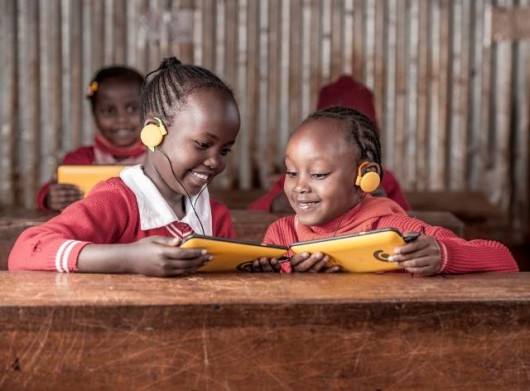Kio Kits: A Modern Education Solution

On a continent where electricity, let alone an internet connection or data coverage, is never a given, bringing technology to the classroom has proven to be a challenge in rural and poor urban regions of Africa.
A BRCK Initiative
But, the African software developers, engineers and technologists of the Kenyan company BRCK have recently rolled out an educational pilot program of tablets, specifically designed to combat connectivity problems.
The program, BRCK Education, comes from the creators of the original BRCK. A router and modem system boasting a built-in global SIM card, internal storage, surge protection, more than 8 hours of battery life, adaptable charging for solar panels, car battery and computer or wall outlet, BRCK grants access to the Cloud from anywhere.
BRCK Education’s pilot Kio Kit, which holds 40 tough Kio tablets, a set of headphones for each student, an original BRCK and wireless charging docks for the Kio, is designed to be a “holistic education technology solution that turns every classroom into a digital classroom,” according to BRCK.
Inside the Kio
The Kio Kits, which look like rugged, plastic suitcases, are not solely made for transporting and recharging the water and drop resistant Kio. The case houses an offline “micro-Cloud” server.
When the case is turned on, the micro-Cloud is activated, giving children and teachers access to the preloaded interactive content saved on the server, without the expense of having to connect to the internet.
Kio, meaning “window” in Swahili, kits are designed to give African school children the same quality education that their technologically more connected peers already enjoy.
The preloaded content is updated remotely, currently by four Kenyan education content companies and the international curriculum giant Pearson. This ensures that all children using the Kio are receiving the most up-to-date information.
But Pearson isn’t the only big-name backing the Kio Kits. Intel, Mozilla, and the African companies JP, e-limu and eKitabu are all getting in on helping the Kio Kits become a success.
Hope For Expansion
The pilot program is currently being run in schools in Kenya, Tanzania and Uganda. The African Wildlife Fund has also purchased Kio Kits to distribute to schools in Ethiopia, Congo and others.
If the pilot program goes well, BRCK is already designed to be used throughout the globe, making it a viable option for other developing nations.
The BRCK Education team hopes to positively change the lives of children who have little or no access to technology through the Kio Kits, in Africa and beyond.
The BRCK team is confident that their system will succeed in changing education for the better. As they claim on their website, “If it works in Africa it will work anywhere.”
– Claire Colby
Sources: BRCK 1, BRCK 2, Forbes, htxt.Africa
Photo: Potentash
